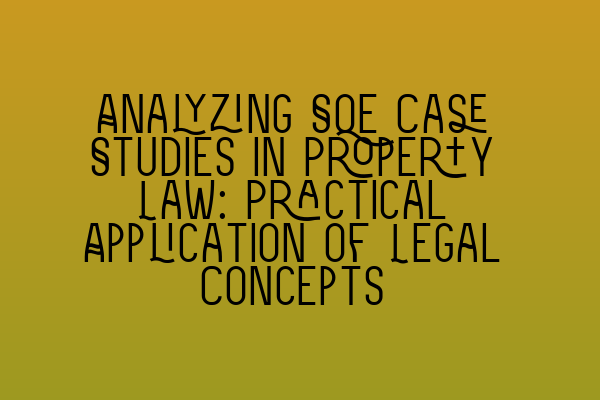Analyzing SQE Case Studies in Property Law: Practical Application of Legal Concepts
Welcome to SQE Property Law & Land Law! As solicitors specializing in property law, we understand the importance of practical application when it comes to legal concepts. In this blog post, we will take a deep dive into analyzing SQE case studies in property law, providing you with valuable insights into how legal principles are applied in real-life scenarios.
Before we begin, it’s essential to stay updated on the latest changes in UK property laws. Make sure to check out our article on Updates in UK Property Laws: Key Changes and Implications for a comprehensive overview.
Case Study 1: Residential Conveyancing
Let’s start with a case study on residential conveyancing. A client named Mr. Smith is purchasing a property and has approached us to handle the legal aspects of the transaction. Our first step is to conduct a thorough due diligence process, which involves examining the property’s title deeds, searches, and relevant regulations.
In this case, an issue arises during the searches. We discover that the property is subject to a restrictive covenant that restricts its use for commercial purposes. This raises a concern as Mr. Smith intends to open a small retail shop on the ground floor of the property.
As solicitors, it is our duty to review and advise on the implications of restrictive covenants. We carefully analyze the covenant’s wording, its enforceability, and any potential exemptions. We conclude that in this case, the restrictive covenant could be modified or discharged through an application to the Upper Tribunal (First-tier Tribunal) under the Law of Property Act 1925.
By providing this practical solution, we ensure that our client can proceed with his plans, enabling him to use the property for commercial purposes. Our knowledge and understanding of the legal framework surrounding restrictive covenants allow us to navigate this complex issue.
Case Study 2: Commercial Leases
Moving on to commercial leases, a case study involving a landlord-tenant dispute highlights the importance of understanding lease laws in the UK. Our client, a commercial tenant named Mrs. Johnson, has been issued a lease renewal notice by her landlord, Mr. Thompson.
Upon reviewing the lease agreement, we identify several unfavorable terms that could potentially impact Mrs. Johnson’s business. The terms include a significant rent increase, restrictive alterations clauses, and unreasonable repairing obligations.
As experienced property solicitors, we advise Mrs. Johnson on her legal rights and options. We explain that she could negotiate with the landlord for more favorable terms, exercise her statutory right to a lease renewal under the Landlord and Tenant Act 1954, or potentially terminate the lease and seek an alternative premises.
Through our expert guidance, Mrs. Johnson successfully negotiates more favorable terms with her landlord, ensuring the continued success of her business while protecting her legal interests.
Enhancing Your Property Law Knowledge
To further enhance your understanding of property law, we recommend reading our articles on:
- Legal challenges in property transactions: A comprehensive guide
- Navigating Lease Laws in the UK: Essential Guidelines for Tenants and Landlords
- Dominate Property Law Questions: Avoiding Common Pitfalls
- Land Law Revision Tips: Ace Your Exam Preparation
By delving into these articles, you’ll gain valuable insights into the key aspects of property law, navigate common pitfalls, and excel in your exam preparation.
Conclusion
At SQE Property Law & Land Law, our expertise lies in the practical application of legal concepts in property law. Through the analysis of real case studies, we have demonstrated how legal principles are applied to protect the interests of our clients.
We encourage you to continue exploring our website for more valuable resources on property law and land law. Should you require any legal assistance or have any questions, please feel free to reach out to us. Our team of dedicated solicitors is here to help you navigate the intricacies of property law with confidence and success.
